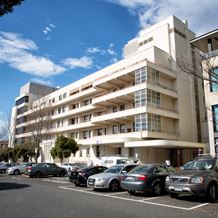Dr Leah Marley Discusses the Importance of Early Detection for Breast Cancer
St Vincent's Private Hospital, East Melbourne
- Home
- Patient News
- Dr Leah Marley, Breast Surgeon, Discusses the Importance of Early Detection

Dr Leah Marley, Breast Surgeon, VBOC
"I always say to women – you know your breasts better than anyone."
October is Breast Cancer Awareness month, a great time to check in with yourself and ask the question – ‘Are you breast aware?’
Dr Leah Marley, Breast Surgeon at Victorian Breast and Oncology Care (VBOC) says she is one of the first points of contact when someone notices a change in their breasts.
“Women generally get referred to me in one of two ways – the first being from their GP, when they’ve noticed a change in their breasts which needs further investigation, or directly from a breast screening centre, when the scan has shown an abnormality. If women are being vigilant with their breast checks, the prognosis is generally good. Even if the diagnoses is cancer, if we catch it early when it’s small, treatment is fairly straightforward - often in the form of surgery and perhaps some radiation - and most women will have no life shortening outcomes.”
In terms of being vigilant, Dr Marley says there’s two key breast checks which women should be doing – that being self-examination and routine breast screening.
“Self-examination is critical to finding any changes early. I always say to women – you know your breasts better than anyone. There are two very simple steps to do this, which I encourage women to do on a weekly basis. The first involves simply standing in front of a mirror and looking at your breasts for any noticeable changes – be it dimpling, puckering, changes to the nipple or areola, redness or changes in size or fullness. Next, jump in the shower, lather up some soap and have a feel for any lumps or differences in texture or roughness within the breast tissue. If you notice any changes or have any concerns, make an appointment with your GP to get it checked.”
Breast screening involves undertaking routine mammograms and are free for women aged 50-74 years. They should be completed every two years.
“Breast cancer can happen to anyone and these days, a lot of women are electing to have breast screens at an earlier age when they’re in their 40’s, especially when they have concerns or a direct family history of the disease – such as a mother or sister who has been diagnosed. Self-referral can be completed through the Breast Screen Australia website. Screening helps any changes or cancerous cells to be detected earlier, when changes may not yet be visible on the outside of the body. The screening process is relatively quick, easy and painless, taking about 10 minutes all up. It’s well worth it for the peace of mind, if nothing else.”
Despite perception, Dr Marley describes her role in the patient journey as a largely positive one.
“In most instances I get to deliver the wonderful news that everything is all clear and there’s no cause for concern. For those one in eight women who will be diagnosed with breast cancer, it’s worth remembering that everything is easier when it’s caught earlier. So make sure you’re helping yourself by doing the checks, knowing your breasts and getting any changes checked as soon as possible.”
To learn more about Dr Marley and the VBOC team visit www.vboc.com.au
For more information or to book your Breast Screen visit www.breastscreen.org.au




